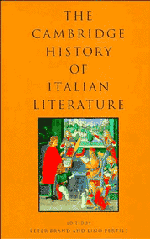Book contents
- Frontmatter
- Origins and Duecento
- The Trecento
- The Quattrocento
- The Cinquecento
- The Seicento: Poetry, Philosophy and Science
- Narrative prose and theatre
- The Settecento
- The Age of Romanticism (1800–1870)
- 27 The Romantic controversy
- 28 Monti
- 29 Foscolo
- 30 Leopardi
- 31 Manzoni and the novel
- 32 Other novelists and poets of the Risorgimento
- 33 Opera since 1800
- The Literature of United Italy (1870–1910)
- The Rise and Fall of Fascism (1910–45)
- The Aftermath of the Second World War (1945–56)
- Contemporary Italy (since 1956)
- Bibliography
- References
29 - Foscolo
from The Age of Romanticism (1800–1870)
Published online by Cambridge University Press: 28 March 2008
- Frontmatter
- Origins and Duecento
- The Trecento
- The Quattrocento
- The Cinquecento
- The Seicento: Poetry, Philosophy and Science
- Narrative prose and theatre
- The Settecento
- The Age of Romanticism (1800–1870)
- 27 The Romantic controversy
- 28 Monti
- 29 Foscolo
- 30 Leopardi
- 31 Manzoni and the novel
- 32 Other novelists and poets of the Risorgimento
- 33 Opera since 1800
- The Literature of United Italy (1870–1910)
- The Rise and Fall of Fascism (1910–45)
- The Aftermath of the Second World War (1945–56)
- Contemporary Italy (since 1956)
- Bibliography
- References
Summary
Love and politics: Ultime lettere di Jacopo Ortis
Ugo Foscolo became famous with Ultime lettere di Jacopo Ortis (‘The Last Letters of Jacopo Ortis’), bringing together fiction, history and autobiography in an epistolary novel which derived its structure and motifs from three of the previous century's best-sellers: Rousseau's Les rêveries du promeneur solitaire and La Nouvelle Héloïse, and Goethe's Die Leiden des jungen Werthers (apart from a host of other sources, including the Bible, Alfieri, Sterne, Gray, Young, and earlier writings by Foscolo himself). The first unfinished draft was completed by a hack, and appeared in three garbled versions (one in 1798, and two in 1799) which were justifiably disowned by Foscolo in 1801. In October 1802 Bodoni published the complete edition as far as Jacopo's suicide. This was subsequently revised and augmented in 1816 and 1817. It dealt, far more clearly than Goethe's Werther, with the contrast between social conformity and individual emotions, which Foscolo clearly described as a political contrast. It suggested, at least a century before Wilhelm Reich, Marcuse and other writers on sexual politics, that political, economic and sexual repression go together. Jacopo cannot marry Teresa because, after Napoleon's cession of Venice to Austria with the Treaty of Campoformio (1797), he has to seek political asylum elsewhere. Her father, already under suspicion, would be further compromised and financially ruined by the match. The unhappy love affair ends with Jacopo's suicide. Foscolo boasted that it was ‘the first book that induced females and the mass of readers to interest themselves in public affairs’ (Essay on the Present Literature of Italy, 1818).
- Type
- Chapter
- Information
- The Cambridge History of Italian Literature , pp. 412 - 417Publisher: Cambridge University PressPrint publication year: 1997



